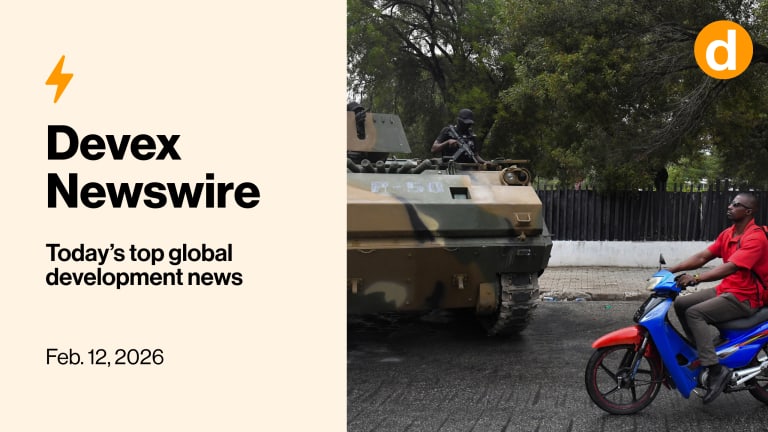COVID-19 threatens decades of progress on global poverty, report says

LONDON — The economic fallout of the COVID-19 pandemic threatens to create a “new era” of poverty, putting decades of progress at risk, research from the United Nations University suggests.
In a worst-case scenario, more than half a billion people — almost 8% of the global population — could be pushed into poverty as a result of the pandemic, according to modeling by researchers at UNU’s World Institute for Development Economics Research.
If realized, it would represent the first increase in global poverty since 1990 and have grave implications for achieving development objectives such as the Sustainable Development Goals.
EU rejigs over €15M in existing aid for coronavirus response
Brussels is changing its priorities to address COVID-19, but not the amount it gives to each country. Reactions from nonprofits and U.N. agencies are mixed, although many are urging more ambitious, fresh funding.
“We’re in a whole new era,” said co-author of the working paper Andy Sumner, professor of international development at King’s College London, who is calling for an economic rescue package.
Based on private market analysts’ predictions of a 5%, 10%, or 20% contraction in consumption or per capita household income in rich countries, the research modeled a range of possibilities. While it is not yet possible to say which will be closest to the final economic impact of the crisis, Sumner noted that the predictions of a 5% contraction were made about a month ago, and that 20% is now a more common prediction.
If that happens, the researchers estimate it would push up to 580 million people into poverty — considerably higher than estimates of the potential poverty impact of COVID-19 from the International Labour Organization and the International Food Policy Research Institute — unless their governments and the international community intervene. In some regions, the researchers say it could result in poverty levels not seen for 30 years.
“We were surprised at the sheer scale of the potential poverty tsunami that could follow COVID-19 in developing countries,” Sumner said.
He added: “Our findings point towards the importance of a dramatic expansion of social safety nets in developing countries as soon as possible and, more broadly, much greater attention to the impact of COVID in developing countries and what the international community can do to help.”
Sumner told Devex he feared the economic situation could be even worse than the scenarios they modeled, suggesting that if a lower-income country where few people can work at home enacted a three-month total lockdown, it could halt 25% of the year's economic activity. The team will keep a “watching brief” on the issue as new data becomes available.
“There’s a lot of people who are above these various poverty lines who are not that far away from falling back under them … Poverty reduction … is actually more fragile than we realize,” Sumner added.
The researchers stressed that the reaction of the international community was critical to preventing the worst economic effects. Oxfam has called on politicians to implement an “economic rescue plan” at the forthcoming World Bank, International Monetary Fund, and G-20 financial meetings.
Kunal Sen, director at UNU-WIDER, said: “This study shows that the achievement of the 2030 Agenda, and in particular, the SDGs on no poverty and zero hunger, is under considerable threat. The need of the hour is to bring together development agencies, national governments, civil society and the private sector in a global effort to protect the livelihoods and lives of the poorest of the poor in the Global South.”
Visit our dedicated COVID-19 page for news, job opportunities, and funding insights.

Search for articles
Most Read
- 1
- 2
- 3
- 4
- 5








